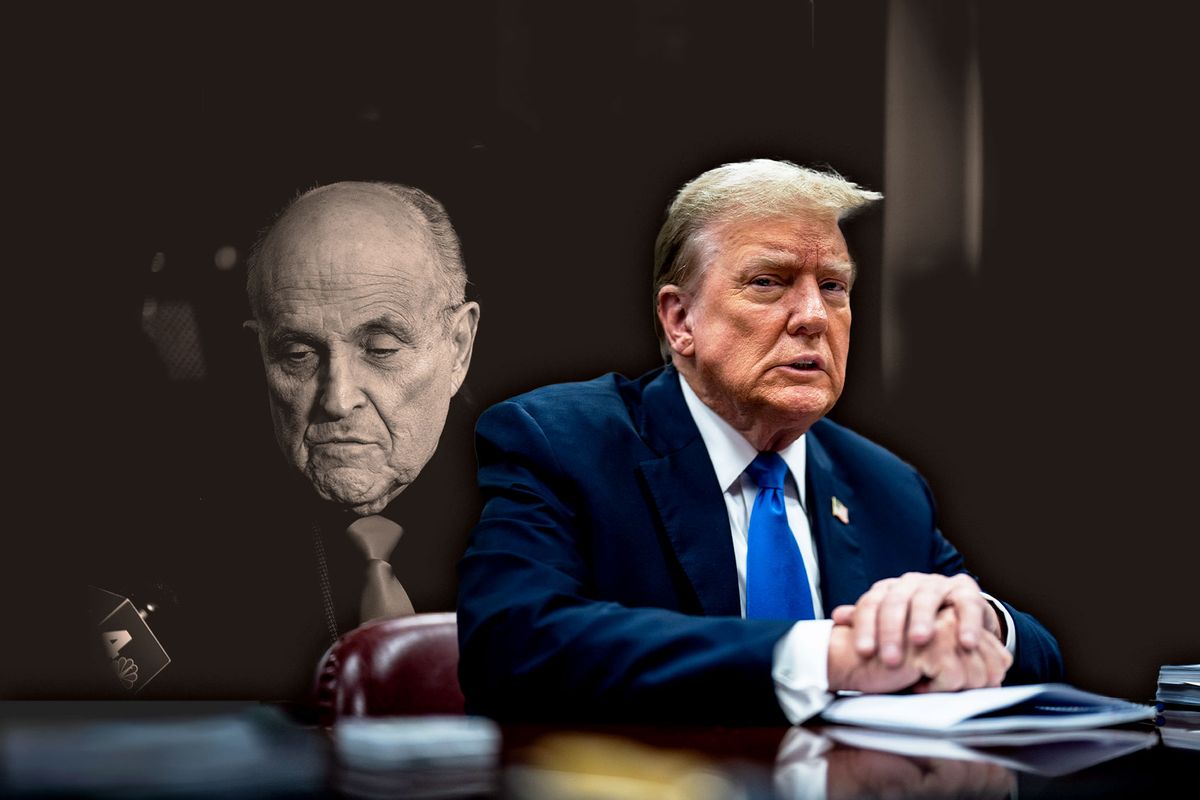Trump’s isolation deepens after his coup crew is hit with Arizona criminal indictments

Because Donald Trump himself wasn’t indicted, there was a surprisingly muted response to the announcement, late on Wednesday, that Arizona Attorney General Kris Mayes had indicted a school bus full of Republican activists and operatives on felony charges related to Trump’s efforts to steal the 2020 election. A real “Trump himself or it doesn’t count” bar has been set regarding interest levels in coup-related cases. The previous indictment for the same scheme in Georgia did include the former president, leading to his infamous mug shot from the Fulton County Jail. Plus, Trump himself is on trial in New York City on charges of cheating in the 2016 election, leading to a tasty stream of images of him looking bedraggled as he goes in and out of court. Hearing that Rudy Giuliani is getting arrested again just can’t compete.
These charges further erode his already-collapsing support system.
But it’s time to take a longer look at these Arizona charges because they will have a major impact on Trump personally, even if he is not indicted (yet) for his role. These charges further erode his already-collapsing support system. Trump goes to court most days without family or friends, just his lawyers and security, people who are paid to be there. Despite his endless pleading, he can’t even get his followers to show up to demonstrate outside the courthouse. The people who were willing to commit crimes to keep him in office in 2020 now have to face the real possibility that sticking by Trump’s side raises their chances of going to prison. Even those foolish enough to take that risk, I suspect, are going to be too busy trying to fend off criminal charges from the last attempted coup to have much time to help Trump with planning the next one.
As I wrote about earlier this week, Trump was only able to pull of January 6 because he had scores of people handling the logistical work for him. Lawyers like Giuliani, John Eastman, and Kenneth Chesebro hatched the plan to create slates of fake electors, with an eye towards pressuring Vice President Mike Pence and members of Congress into accepting them instead of the real electors chosen by voters. Trump’s co-conspirators set up an actual “war room” at Willard Hotel, where the people behind the legal scheme regularly communicated with propagandists like Steve Bannon, whose role was to get ordinary MAGA folks to show up at the Capitol on January 6 to heed Trump’s call to “fight like hell.” Groups like the Proud Boys and Oath Keepers, who were in near-daily contact with Trump ally Roger Stone, took on the planning when it came to leading the charge to the Capitol. Trump’s chief of staff, Mark Meadows, took on the role of traffic cop, managing many of the various conspirators as they worked their own angles.
Want more Amanda Marcotte on politics? Subscribe to her newsletter Standing Room Only.
Now many, if not most, of these people are alienated from Trump to some degree, in no small part because of all the legal jeopardy their schemes have put them in. Experts flagged that Chesebro is not listed in the Arizona indictments, suggesting that he’s cooperating with the prosecution, as he is in Michigan. But even some of the usual names that crop up in the various legal maneuvers post-January 6 belong to people who just don’t seem that involved with Trump anymore.
Even those foolish enough to take that risk, I suspect, are going to be too busy trying to fend off criminal charges from the last attempted coup to have much time to help Trump with planning the next one.
To be certain, not everyone involved in the coup conspiracy has scootched away from Trump. Boris Epshteyn, a longtime Trump stooge, traveled with him Thursday to court in Manhattan, even as he didn’t go into the building. Epshsteyn was among the 18 people indicted in Arizona on Wednesday. Notably, though, this is the first time Epshteyn has been in legal trouble — for his role in the coup, at least. He’s been arrested twice before, once for bar-fighting in 2014 and again for groping women in a bar in 2021. The latter is a well-known way to impress Trump. Sure enough, shortly thereafter, Epshteyn’s star began to rise in Trump world, even though the charges were later reduced to disorderly conduct. But Epshteyn is learning the lesson that seems to come for most Trump cronies: Stick with Trump and, sooner or later, you’ll either be under arrest or striking a cooperation deal with the prosecution.
Only Giuliani seems totally incapable of learning. He took a moment out of his busy legal calendar to release a statement complaining, “It’s not a coincidence that this is happening as we approach the summer before the election.” He repeated Trump’s election lies and even name-checked Trump, claiming he’s “the biggest threat to their grasp on power.” But it speaks volumes about how far Giuliani has fallen that he has to beg for Trump’s attention like this. Hey, maybe if Trump keeps losing people, he’ll cave and give ol’ Rudy a ring.
Most former Trump cronies seem to get it, though. Certainly, National Enquirer publisher David Pecker is living through that morality tale. During his lengthy court testimony against Trump in the Manhattan case, Pecker walked through many stories in which he was used and abused by Trump. Pecker’s actions in 2015 and 2016 to help Trump at the National Enquirer put him in serious legal jeopardy, but throughout his testimony, he described how Trump repaid him: By screwing him over at every turn. Pecker described paying hush money to women on Trump’s behalf, only to have Trump renege on the deal to pay him back. When reporters at the Wall Street Journal uncovered the hush money conspiracy, even though Pecker hadn’t been the leaker, Trump still called him and screamed at him, blaming him. When Pecker expressed anxiety about committing crimes, Trump had his fixer, Michael Cohen, call and threaten him.
Hopefully, people who consider joining up with one of Trump’s future criminal conspiracies are paying attention to all this and realizing it’s not worth it. The fates of people who agreed to be fake electors should give would-be conspirators pause. Many of the people recruited by Giuliani, Chesebro and company never even met Trump before they agreed to commit crimes for him. As both the House committee investigating January 6 and the indictment by special prosecutor Jack Smith detail, a good number of the fake electors raised concerns that they could be arrested for their part in the scheme. Giuliani often reassured them, falsely, that they were safe from prosecution. Now people who stepped into that role in at least three states — Michigan, Arizona, and Georgia — are facing serious legal consequences for doing so.
Are Republicans finally starting to learn that Trump will never return the loyalty he’s shown? His loneliness at trial is a promising hint that they may, finally, be starting to get it. Sure, Republican politicians like Speaker of the House Mike Johnson of Louisiana still know they have to make a big public display of kissing Trump’s ring. (Though notably, he did so and then turned around and passed the Ukraine aid Trump hates.) But it’s telling that even the biggest Trump bootlickers in Congress just keep not finding the time to visit him in New York, though his miserable expressions suggest he could use a little cheering up these days. Rep. Elise Stefanik, R-N.Y., knows the trial is right in her backyard, but somehow she couldn’t take a day away from demagoguing about Ivy League universities to hold Trump’s hand through it for a day. Maybe she’s worried about the smell? It is hard to wash it out of those ugly blazers she loves wearing. Or maybe she, like an increasing number of Republicans, is finally starting to get it: Getting close to Trump and his various criminal schemes, even if it’s just to sit through a trial, is dangerous business. Indeed it’s best to leave him to hang out and dry.
Read more
about this topic


